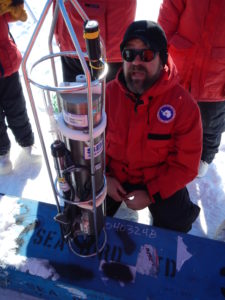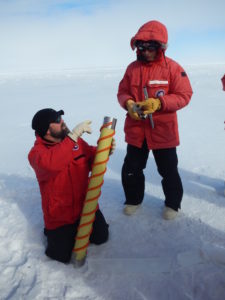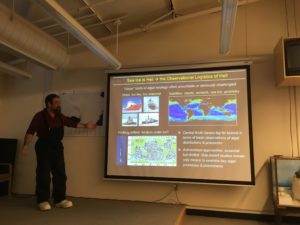Educational efforts
Education and the training of the next generation of ocean specialists are important aspects of my professional life. As a practitioner, I am active within various educational programs at and beyond WHOI. As a education scholar, I have continued to pursue my interests in cross-disciplinary STEM training and in core areas of higher ed through my MEd in Higher Education in the College of Education at the University of Massachusetts, Amherst, and other avenues.
I am faculty in the MIT/WHOI Joint Program and have trained graduate students and/or taught graduate courses in three disciplinary areas within the JP:
- The Joint Program for Biological Oceanography (JPBO)
- The Joint Program for Applied Ocean Science and Engineering (JPAOSE)
- The Joint Program for Chemical Oceangraphy (JPCO)
As faculty in the JPAOSE I co-taught the introductory course in Principles of Ocean Instrument Systems (MIT 2.688) . It is a semester-long, hands-on 12-unit graduate-level course taught in the Fall of each academic year, required for all JPAOSE students. During COVID I reworked the laboratory elements of 2.688 so that they could be completed by students at home.
As faculty in the JPBO discipline I revised and co-taught Elements of Modern Oceanography (MIT 12.702). This is a special, 12-credit semester-long graduate course in foundational oceanography designed to increase cross-disciplinary breadth across the entire Joint Program. 'Elements' was also the keystone academic course for WHOI's former Semester at WHOI (SAW) resident undergraduate program.
I co-taught the JPBO introductory course in Biological Oceanography (MIT 7.470) . It is our semester-long, 12-unit graduate-level course taught in the Spring of each academic year, and is required for all JPBO students.
I also have developed and taught a special topics course, MIT 7.433 Marine Bio-Optics. This is an introduction to marine optics and its applications in oceanography which focuses heavily on hands-on, laboratory experience with optical instruments and principles.
I have a strong interest in research and innovation in higher education. This includes collaborative work to ideate and develop new programs and initiatives, but also self-directed work in areas of higher ed research of interest to me.
- Integrative and interdisciplinary training in STEM fields: I am a firm believer in the value of study and research among and between established STEM disciplines. I approach this through practice but also through research, studying the principles and pedagogy of disciplinary integration.
- Professional doctorate and postdoctoral programs: My research focus with my MEd program was in the area of alternatives to standard PhD and postdoctoral programs in STEM fields, as a means to enhance training toward non-research careers. I believe such programs offer considerable value in training the next generation of ocean specialists to meet evolving societal needs.
- STEM in a liberal arts curriculum: I've had the opportunity twice to serve as a Visiting Professor at Deep Springs College in California. In 2007 I developed and led courses and independent studies in Single Variable Calculus, Multivariable Calculus, and Numerical Methods & Computer Modeling. In 2011 I returned to teach Single Variable Calculus and in Multivariable Calculus again. Both instances provided opportunities to rethink and explore quantitative skill building and awareness in non-STEM undergraduates.
My interest in polar oceanography started with an opportunity to participate in the International Graduate Training Course in Antarctic Marine Biology, a NSF-sponsored training course at McMurdo Station, which I attended in 2006. This course was offered semi-annually and gave students a broad exposure to laboratory and field work in polar environments. I was invited to return to McMurdo and join this course again in 2018-2019 as an instructor.


